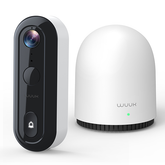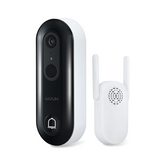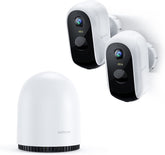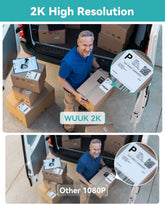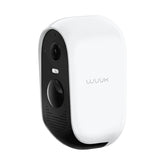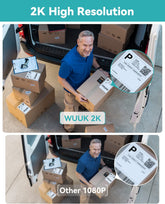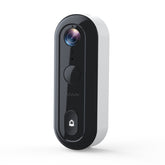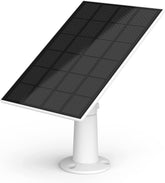Color Night Vision Security Cameras: How Do They Work?
For home and business owners looking to upgrade their security camera systems, color night vision cameras provide an advanced way to monitor property vividly even in total darkness. While traditional night vision cameras rely on infrared illumination to see in low-light environments, color night vision technology utilizes specialized camera sensors and processing to leverage minimal ambient light at night to deliver full-color video footage. In this comprehensive guide, we will dive into the inner workings of color night vision, its advantages over conventional night vision, and what to look for when installing color night vision security cameras.

What is Color Night Vision and How Does it Work?
Standard night vision cameras depend on infrared LED lights installed around the camera to illuminate an area with infrared wavelength light invisible to the human eye. The camera sensor picks up this infrared light and shows a black-and-white video feed. The drawback is that these cameras cannot see in complete darkness and require some ambient infrared light.
Color night vision cameras work quite differently using advanced imaging capabilities to see in the dark. Instead of using infrared LEDs, they rely solely on tiny amounts of natural ambient light from the moon, stars, or distant man-made light sources. While this light is imperceptible to our eyes and too faint for a normal camera sensor, color night vision cameras can detect these subtle light variations and transform them into full-color video footage.
So how is this possible? Color night vision cameras utilize highly specialized camera sensors and software processing to amplify minuscule light signals up to 10,000 times. Here are the core technologies that make this remarkable capability possible:
- Ultra-Sensitive Image Sensors - The image sensor, or camera chip, contains oversized photodiodes with noise-reduction capabilities to capture more photons in low-light scenarios.
- Starlight Imaging Technology - Proprietary algorithms combine pixel data on the sensor to increase sensitivity to faint light. More pixel data means more light can be detected to recreate a color image.
- Advanced Image Signal Processing - Sophisticated software removes visual noise and optimizes color reproduction from the weak light information collected by the sensor.
- Wide Aperture Lens - A larger aperture lens gathers more ambient light to improve color night vision performance.
By leveraging these cutting-edge imaging technologies, color night vision quite literally turns night into day with colorful, well-lit imaging even in the dead of night.

The Benefits of Color Night Vision Security Cameras
Compared to traditional infrared night vision, color night vision technology provides some significant advantages:
- Vivid Color Imaging in Total Darkness - Discern colors of clothing, vehicles, foliage, signs, and other objects at night, which aids identification.
- Superior Clarity and Accuracy - View sharper and more detailed video footage with color night vision thanks to higher resolution sensors. Colors also enhance object recognition.
- Works in Extremely Low Light - Functions even in 0 lux conditions on the tiniest amounts of ambient light, outperforming infrared cameras.
- No Infrared Illuminators Needed - Eliminates the cost and maintenance of IR spotlights or floodlights.
- Natural and Clear Footage - Color night video looks closer to real-life daytime footage compared to grayscale infrared video.
- Wider Field of View - Many color night vision cameras boast at least a 120-degree field of view to cover more area.
- Long Range Night Vision - Advanced models can provide clear color imaging at distances over 300 feet at night.
Factors to Consider When Purchasing Color Night Vision Security Cameras
When investing in color night vision security cameras, keep the following criteria in mind:
- Light Sensitivity - Measured in lux, the lower the lux rating, the better the low light performance. Look for 0.0001 lux or lower.
- Video Resolution - Look for 1080p or 2K resolution for highly detailed footage. Avoid cameras below 720p resolution.
- Lens Quality - High-end lenses with large apertures and ample magnification enhance color night vision capabilities.
- Infrared Functionality - Some models include infrared LEDs to supplement color night vision in near-zero light scenarios.
- Field of View - A 90-degree field of view or higher provides a wide monitoring angle.
- Weather Resistance - IP66 or IP67 ratings denote fully weatherproof cameras that can withstand the elements.
- Smart Features - Consider AI-powered cameras with facial recognition, motion tracking, customized activity alerts, and other intelligent features.
- Storage - Opt for cameras with built-in SD card slots, and a cloud storage option to cater to your different monitoring needs for home or for business.
With their unparalleled imaging abilities in dark conditions, color night vision cameras provide an invaluable upgrade over traditional security cameras. Follow this buyer's guide and choose the right color night vision model to fulfill your unique security demands.
Q&A
Q1: Can night vision cameras see color?
A1: Yes, certain advanced night vision cameras can see color, especially those equipped with "color night vision" technology. These cameras use highly sensitive sensors combined with advanced image processing to capture and reproduce color images in low-light conditions. However, the amount and quality of color captured depends on the available ambient light. In extremely low-light situations, even these cameras may revert to traditional black-and-white infrared imaging.
Q2: Do night vision cameras work in daylight?
A2: Yes, night vision cameras can work in daylight. Most modern night vision cameras are equipped with sensors that can operate both in low-light conditions and during daylight. During the day, these cameras function like regular cameras, capturing full-color images. When the light level drops, they automatically switch to night vision mode, using infrared (IR) illumination or other night vision technologies to capture images in darkness.


